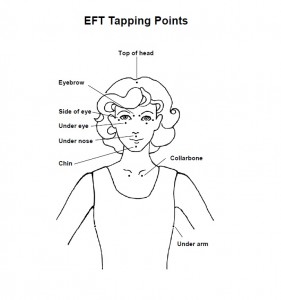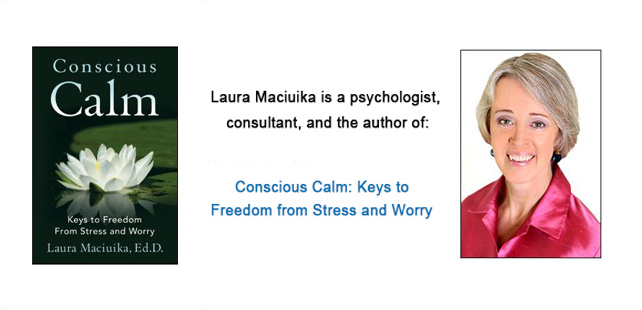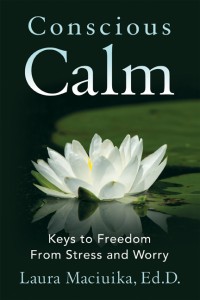 EFT (Emotional Freedom Techniques, a.k.a. “Tapping”) is one of the many energy psychology methods that can be used to shift emotional and cognitive states and often clear emotional intensity. In some clinical circles, especially in working with trauma, EFT is accurately being described as “acupressure-assisted exposure therapy.” Increasingly, EFT is being used in many areas including the healing of trauma in veterans, with public speaking anxiety, in EFT and athletic performance, and as a basic tool for stress relief and increased relaxation. EFT continues to spread across the globe as an easy tool to both learn and use.
EFT (Emotional Freedom Techniques, a.k.a. “Tapping”) is one of the many energy psychology methods that can be used to shift emotional and cognitive states and often clear emotional intensity. In some clinical circles, especially in working with trauma, EFT is accurately being described as “acupressure-assisted exposure therapy.” Increasingly, EFT is being used in many areas including the healing of trauma in veterans, with public speaking anxiety, in EFT and athletic performance, and as a basic tool for stress relief and increased relaxation. EFT continues to spread across the globe as an easy tool to both learn and use.
Part of the popularity and effectiveness of EFT is that the EFT protocol can be done by people on their own in simpler, more basic ways with minimal training and without needing to rely on a practitioner. As a psychologist, for me this was one of the benefits of teaching EFT to my clients, which I started to do soon after my initial training in EFT back in 1999. People could take the technique home, and use it as much or as little as they chose in between sessions depending on their motivation and goals. We then could use EFT together in consultation in more complex ways that often require more complex tracking of history and emotional information.
Recently, the American Psychological Association finally gave way (after over 5 years of discussion and battle) and is acknowledging energy psychology trainings for continuing education units, or CEU’s, through the Association of Comprehensive Energy Psychology, or ACEP. ACEP was instrumental in gathering research evidence and putting together the rounds of appeals in this process. Discussions continue about allowing ACEP certified practitioners teach energy psychology techniques for CEU’s outside of the ACEP annual conference. Research continues on various techniques within energy psychology, with EFT one of the most commonly discussed given its spreading popularity and ease of administration. Research is being conducted on the effectiveness of EFT on its own, and also in comparison to other common treatment modalities, including EMDR (Eye Movement Desensitization and Reprocessing), among others.
EFT is also being explored in academic settings as a tool for stress relief, anxiety relief, and greater success in academic performance. Recently a pilot study was published in the journal Innovative Practice in Higher Education. The study was titled “Tapping for success: A pilot study to explore if Emotional Freedom Techniques (EFT) can reduce anxiety and enhance academic performance in University students.”
The study had a smaller sample appropriate to a pilot study: 52 university students in a research methods course who were preparing to give a presentation. Public speaking famously brings up anxiety for many people, and the assumption was made that a proportion of the students might be anxious about speaking in front of their class. The students were given a short, 15 minute introduction to EFT, or meridian tapping, and were guided through one round of EFT, focusing on their anxiety. They were told that they could use EFT at any point before their presentation if they chose. Of the 88% of students who did use EFT, on two different measurements of anxiety and stress level there were significant reductions of anxiety. Further qualitative data focused on the students’ experiences including anxiety, and using EFT to stay more calm and focused.
Routinely, I work with people who are quite successful by any measure, who feel a lack confidence or success. Often, when we take a look at what is going on internally, there is a strong focus on “what I’m not doing right,” or “What might go wrong” or “What if I sound like an idiot,” or something similar. Those negative, rather harsh self-reflections and self talk naturally bring up tension, stress, and anxiety in the body. All of that naturally sets anyone up for less confidence, and less likelihood for ease in achieving success or feeling successful.
Instead of trying to “be less anxious” or “get more confidence,” using a grounding technique like lengthening the breath to activate the vagus nerve, or using an energy psychology technique like EFT, can help bring you back into the moment. With that, the negative self talk and their attendant emotions are easier to stop. When using EFT, instead of trying to tap on “this lack of confidence,” as some people try to do, it is usually more effective to focus on what sensations are noticed in the body. “This tension in my jaw” or “This tight breathing” are more specific aspects of nervousness and anxiety. With either breathing or tapping, the body tends to move out of underlying “fight or flight” response, and activate the relaxation response. Instead of focusing on trying to be more confident by fighting through anxiety, or trying to achieve success by pushing through nervousness, it can be more effective – and kinder to oneself! – to ease out the underlying tension and anxiety instead. More relaxation and focus on the present naturally leads to stress relief, and brings out natural confidence and greater natural success in any endeavor.
Dr. Laura Maciuika is a psychologist and the author of Conscious Calm: Keys to Freedom from Stress and Worry




